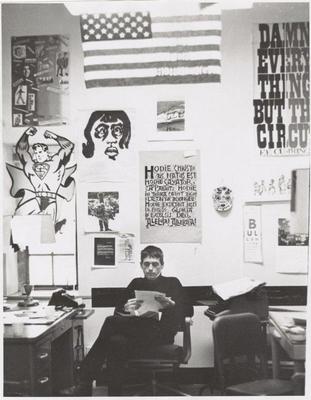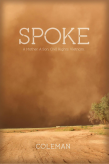
Daniel Berrigan, S.J., died yesterday.
This photo of Dan in his Cornell office was taken around the time that we met. I was working in the office directly across the hall, and witnessed the traffic of interesting visitors that paraded in and out of his small office, until finally one day, I ventured in myself.
In 1970, Dan testified as my “character witness” at my Rochester Trial for destroying draft files. His testimony was widely reported, but it was this coverage by the Harvard Crimson that I think captured it best:
"THE HIGH moment of the first week, however, was undoubtedly the appearance of Father Berrigan, who is serving a three-and-one-half-year sentence for destroying draft files. Brought from Danbury "Correctional Institute" to testify as a character witness for Joe Gilchrist, who was a student at Cornell during Berrigan's chaplaincy there, the priest was on the stand for three hours.
Over the frequent vehement objections of Walford, who was openly outraged that Berrigan should even be there to testify, "Father Dan" forcefully and movingly related to the court the content of frequent conversations he had with Joe during the two years they were together in Ithaca. He told of the experience of seeking shelter underground as protection from a B-52 bombing raid on Hanoi while he was there in 1967 on a mission of mercy to bring back to America three POW's. He spoke of the children he saw in North Vietnam who had been burned with napalm, and of the total destruction of the countryside and food supply of that small nation. He told of his growing concern that Americans were unaware of the things being done in their name by the Johnson and Nixon administrations inVietnam. He told how he came to believe that speaking out against the war and injustice here at home were not sufficient, that one had to risk suffering and persecution, jail and maybe even death if he were serious about wanting an end to the killing. This gentle man, who has been such a clear and consistent voice against the institutionalized killing which America has promulgated both in Southeast Asia and in the ghettos and on the campuses at home, struck to the heart of what had moved the eight young people to do more than simply speak against injustice. His presentation was soft and he faltered at times.
Sounding very tired and drawn, constantly asking for water as he spoke, several times he apologized to those in the courtroom for "not being very sharp today." Each time he tried to explain that he'd been kept in solitary for three days, the judge would silence him and order the remarks stricken from the record. Finally, Dan burst out to tell the packed room that he would neither eat nor drink until he was back in Danbury, as a way of protesting the brutal treatment given to prisoners who are in transit from one jail to another. He had been taken from Danbury on Tuesday, and was not told where he was going or for what he was being taken away. He spent three days and nights either traveling or in solitary confinement, never permitted to mix with other prisoners in the jails where he was kept. It was not until the night before he testified that he was permitted to know where he was being taken.
At one point in his testimony, after a thirty-minute battle between the prosecution and the defendants as to the propriety of entering scripture as testimony, Joan Nicholson introduced into evidence Matthew 5:1-12, from Christ's Sermon on the Mount. This was after the government had objected to entering the Holy Bible as evidence, claiming it to be irrelevant. Judge Burke sustained the objection. The beatitudes were not ruled objectionable, however, and Father Berrigan slowly read through the ancient teachings of Christ. In the crowded courtroom, the old words took on new meaning to those who understood how much the government detests the kind of testimony that men of the church like Berrigan can offer about the effects of national policy. Near the end of the passage he read:
Blessed are ye, when men shall revile you, and persecute you, and shall say all manner of evil against you falsely for my sake.
Rejoice and be exceedingly glad; for great is your reward in heaven, for so persecuted they the prophets which were before you.
The world will miss you, Daniel Berrigan.
This photo of Dan in his Cornell office was taken around the time that we met. I was working in the office directly across the hall, and witnessed the traffic of interesting visitors that paraded in and out of his small office, until finally one day, I ventured in myself.
In 1970, Dan testified as my “character witness” at my Rochester Trial for destroying draft files. His testimony was widely reported, but it was this coverage by the Harvard Crimson that I think captured it best:
"THE HIGH moment of the first week, however, was undoubtedly the appearance of Father Berrigan, who is serving a three-and-one-half-year sentence for destroying draft files. Brought from Danbury "Correctional Institute" to testify as a character witness for Joe Gilchrist, who was a student at Cornell during Berrigan's chaplaincy there, the priest was on the stand for three hours.
Over the frequent vehement objections of Walford, who was openly outraged that Berrigan should even be there to testify, "Father Dan" forcefully and movingly related to the court the content of frequent conversations he had with Joe during the two years they were together in Ithaca. He told of the experience of seeking shelter underground as protection from a B-52 bombing raid on Hanoi while he was there in 1967 on a mission of mercy to bring back to America three POW's. He spoke of the children he saw in North Vietnam who had been burned with napalm, and of the total destruction of the countryside and food supply of that small nation. He told of his growing concern that Americans were unaware of the things being done in their name by the Johnson and Nixon administrations inVietnam. He told how he came to believe that speaking out against the war and injustice here at home were not sufficient, that one had to risk suffering and persecution, jail and maybe even death if he were serious about wanting an end to the killing. This gentle man, who has been such a clear and consistent voice against the institutionalized killing which America has promulgated both in Southeast Asia and in the ghettos and on the campuses at home, struck to the heart of what had moved the eight young people to do more than simply speak against injustice. His presentation was soft and he faltered at times.
Sounding very tired and drawn, constantly asking for water as he spoke, several times he apologized to those in the courtroom for "not being very sharp today." Each time he tried to explain that he'd been kept in solitary for three days, the judge would silence him and order the remarks stricken from the record. Finally, Dan burst out to tell the packed room that he would neither eat nor drink until he was back in Danbury, as a way of protesting the brutal treatment given to prisoners who are in transit from one jail to another. He had been taken from Danbury on Tuesday, and was not told where he was going or for what he was being taken away. He spent three days and nights either traveling or in solitary confinement, never permitted to mix with other prisoners in the jails where he was kept. It was not until the night before he testified that he was permitted to know where he was being taken.
At one point in his testimony, after a thirty-minute battle between the prosecution and the defendants as to the propriety of entering scripture as testimony, Joan Nicholson introduced into evidence Matthew 5:1-12, from Christ's Sermon on the Mount. This was after the government had objected to entering the Holy Bible as evidence, claiming it to be irrelevant. Judge Burke sustained the objection. The beatitudes were not ruled objectionable, however, and Father Berrigan slowly read through the ancient teachings of Christ. In the crowded courtroom, the old words took on new meaning to those who understood how much the government detests the kind of testimony that men of the church like Berrigan can offer about the effects of national policy. Near the end of the passage he read:
Blessed are ye, when men shall revile you, and persecute you, and shall say all manner of evil against you falsely for my sake.
Rejoice and be exceedingly glad; for great is your reward in heaven, for so persecuted they the prophets which were before you.
The world will miss you, Daniel Berrigan.

 RSS Feed
RSS Feed